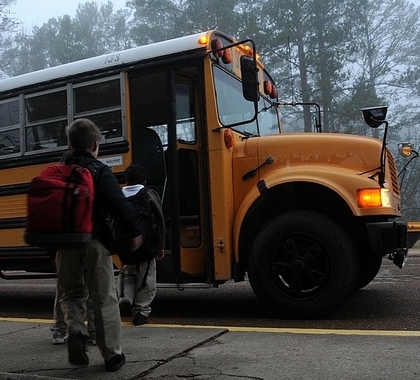“Our results support our hypothesis that highly regulated voucher program environments induce homogenization in the supply of schools,” authors Corey A. DeAngelis and Lindsey M. Burke report in their study, “Does Regulation Induce Homogenization? An Analysis of Three Voucher Programs in the United States,” released in September.
“We employ school and year fixed-effects regression to determine the effect of voucher programs on the supply of private schools. In particular, we examine individual private schools in Washington, D.C., Indiana, and Louisiana as they transition into voucher program environments,” the researchers write. “We leverage the Private School Universe Survey to examine how schools self-identify before and after switching into voucher environments. We find that upon switching into school voucher programs, private schools in more heavily regulated programs are more likely to identify as less specialized than they were prior to entering the program, and that those schools in more lightly regulated environments continue to highlight their specialized approach to education.”
‘Balance the Costs of Regulation’
Lawmakers should weigh both the pros and cons of regulation, the authors conclude.
“Our estimates indicate that additional regulations could reduce specialization in the supply of schooling, and, as a result, fewer choices for families,” DeAngelis and Burke write. “If the diverse backgrounds, interests, and abilities of children are not matched with the available institutions, educational choice programs could fail to lead to improved outcomes. Consequently, decision-makers must balance the costs of regulation, such as homogenization in the supply of schools, with the benefits of regulation, such as perceived control, in order to design the educational choice policies that work best for families and society overall.”
‘They Need Diverse Options’
DeAngelis, a policy analyst at the Cato Institute’s Center for Educational Freedom, says voucher regulations do more harm than good.
“We theorized that heavy regulatory environments in voucher programs in the United States could actually have unintended consequences,” DeAngelis told School Reform News. “Our theory was that if government was telling the private schools in the voucher program to behave exactly like the public schools, then the private schools are in fact going to turn out looking like and operating like traditional public schools. We theorized this could be a negative impact, because of the fact that children are unique and they need diverse options for schools.”
DeAngelis says the data shows overregulation, in addition to decreasing alternatives for students, could also reduce academic achievement.
“There is some evidence that suggests having a highly regulated school choice program actually decreases student outcomes,” DeAngelis said. “For example, in Louisiana, this was the most heavily regulated program that we found, offering the lowest number of various choices for children, and this was the first experiment in the United States, or in the world actually, to find a negative statistical impact on student test scores within the first couple of years.”
Flaws of Test-Based Accountability
Will Flanders, research director at the Wisconsin Institute for Law and Liberty, says one helpful choice would be for policymakers to avoid overemphasizing standardized testing.
“The number one thing [I would advise lawmakers to do] would be to shy away from test-based accountability,” Flanders said. “I think more than any other factors, threatening schools with closure if test scores aren’t high enough and things of that nature can have a severe negative effect on the diversity of the private school sector and lead to that homogenization that the paper is talking about.
“Financial accountability that just makes sure the schools are good stewards of taxpayer money is sufficient and actually leads to better test outcomes as well,” Flanders said. “Lawmakers should really keep the regulatory burden as light as it can be.”
‘Leave a Minimal Footprint’
Ben DeGrow, director of education policy at the Mackinac Center, says lawmakers should realize their own limitations in regulating schools.
“Creating a voucher program that heavily regulates private schools until they all look the same is just another way of depriving students and parents of having real options,” DeGrow said. “Part of the strength and vibrancy of educational choice comes from allowing for innovative approaches that could help certain children learn more at an effective cost. As lawmakers look at adopting or updating an educational choice program, they should leave a minimal footprint on the schools whose doors they are opening to more students who might benefit from their teachers and programs.
“Setting basic standards and guidelines is fine, but lawmakers should be wise and humble enough to recognize that there are multiple ways to measure school quality and that parents provide the most effective form of accountability,” DeGrow said.
Letting Parents Decide
Flanders says school choice programs work best when they put parents in charge.
“The important thing is to let the deciding factor, the ultimate accountability, be the parents and families,” Flanders said. “Having a test score available that can be compared across schools isn’t necessarily a bad thing. Where I have a problem is where the government says the test score is the end-all, be-all and the school is going to be closed if you fail to reach a certain threshold. There are other important factors as well.
“The important thing is to allow parents to be an informed consumer by providing testing information, safety data, and any sort of information the parent would want to know about the school,” Flanders said.
Teresa Mull ([email protected]) is a research fellow in education policy at The Heartland Institute.
INTERNET INFO:
Corey A. DeAngelis and Lindsey M. Burke, “Does Regulation Induce Homogenization? An Analysis of Three Voucher Programs in the United States,” University of Arkansas, September 2017: https://heartland.org/publications-resources/publications/does-regulation-induce-homogenization?source=policybot





